A Research Proposal on Health Inequalities for Women in KSA
VerifiedAdded on 2023/03/31
|14
|3046
|191
Report
AI Summary
This research proposal investigates the reasons behind health inequalities among women in Saudi Arabia (KSA), examining mortality and morbidity rates, underlying causes of health disparities, and the impact on women's quality of life compared to men. It also explores government initiatives and public health interventions aimed at addressing these inequalities, particularly in remote areas. A systematic review of literature from the past five years will be conducted to ascertain current health inequality data in KSA, focusing on factors like gender inequality, lack of funding, transportation, education, and healthcare access. The proposal identifies a research gap in the lack of specific reasons cited for health-related inequalities, despite improvements in women's life expectancy due to increased healthcare access. The study aims to provide a summarized overview of the healthcare system of KSA and evaluate the effectiveness of public health initiatives in reducing health-related inequalities. Desklib provides access to similar documents and solved assignments for students.
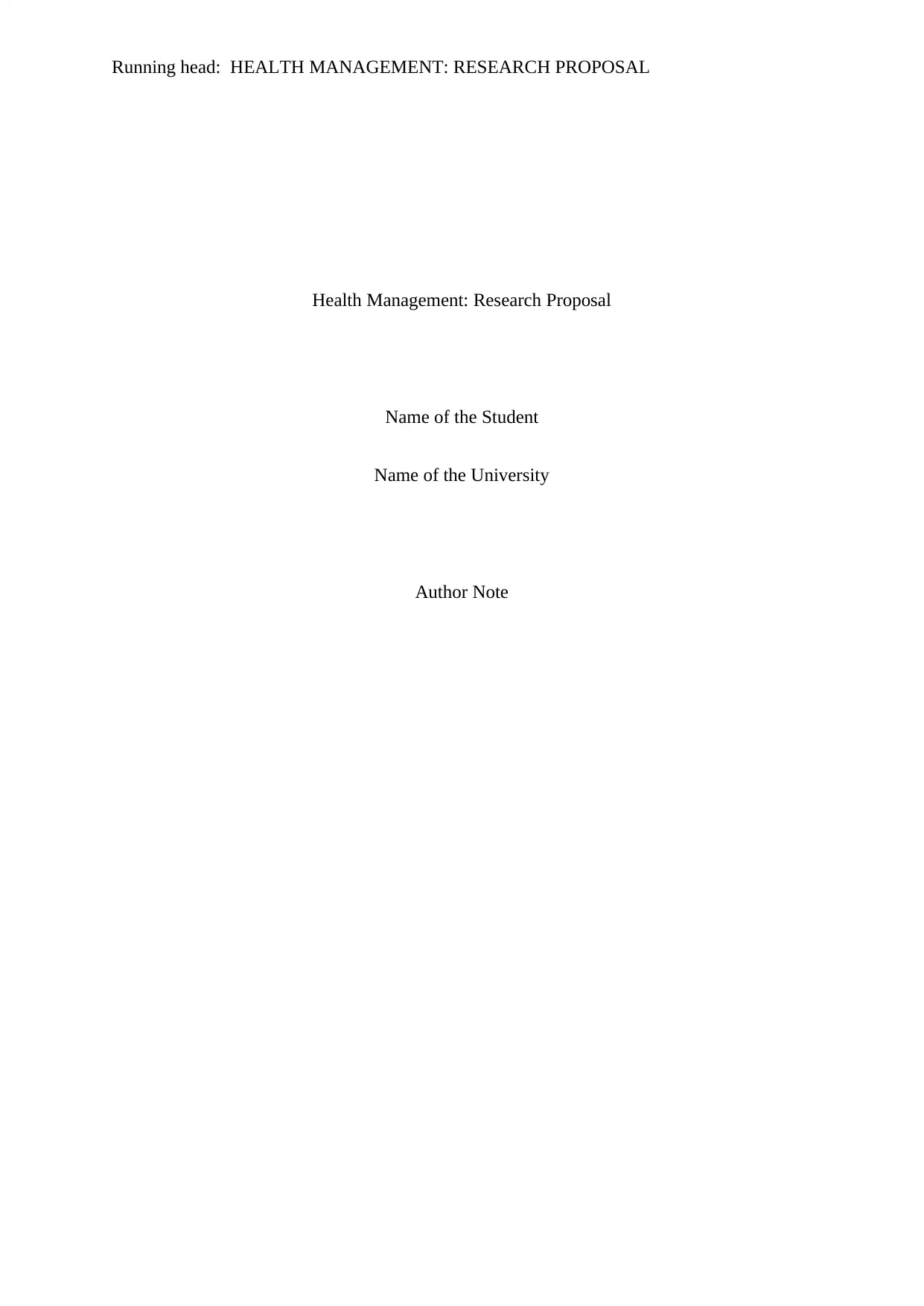
Running head: HEALTH MANAGEMENT: RESEARCH PROPOSAL
Health Management: Research Proposal
Name of the Student
Name of the University
Author Note
Health Management: Research Proposal
Name of the Student
Name of the University
Author Note
Paraphrase This Document
Need a fresh take? Get an instant paraphrase of this document with our AI Paraphraser
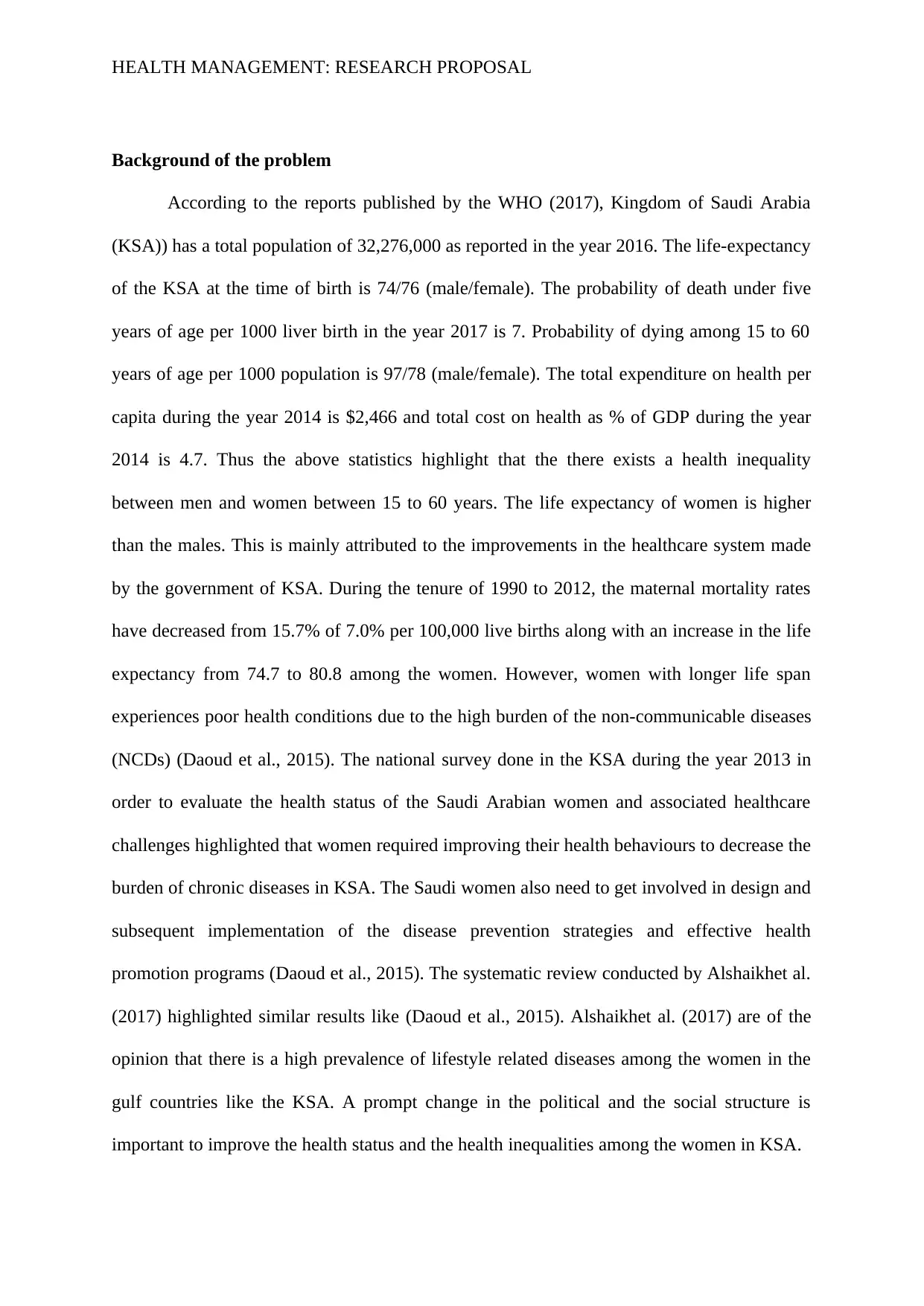
HEALTH MANAGEMENT: RESEARCH PROPOSAL
Background of the problem
According to the reports published by the WHO (2017), Kingdom of Saudi Arabia
(KSA)) has a total population of 32,276,000 as reported in the year 2016. The life-expectancy
of the KSA at the time of birth is 74/76 (male/female). The probability of death under five
years of age per 1000 liver birth in the year 2017 is 7. Probability of dying among 15 to 60
years of age per 1000 population is 97/78 (male/female). The total expenditure on health per
capita during the year 2014 is $2,466 and total cost on health as % of GDP during the year
2014 is 4.7. Thus the above statistics highlight that the there exists a health inequality
between men and women between 15 to 60 years. The life expectancy of women is higher
than the males. This is mainly attributed to the improvements in the healthcare system made
by the government of KSA. During the tenure of 1990 to 2012, the maternal mortality rates
have decreased from 15.7% of 7.0% per 100,000 live births along with an increase in the life
expectancy from 74.7 to 80.8 among the women. However, women with longer life span
experiences poor health conditions due to the high burden of the non-communicable diseases
(NCDs) (Daoud et al., 2015). The national survey done in the KSA during the year 2013 in
order to evaluate the health status of the Saudi Arabian women and associated healthcare
challenges highlighted that women required improving their health behaviours to decrease the
burden of chronic diseases in KSA. The Saudi women also need to get involved in design and
subsequent implementation of the disease prevention strategies and effective health
promotion programs (Daoud et al., 2015). The systematic review conducted by Alshaikhet al.
(2017) highlighted similar results like (Daoud et al., 2015). Alshaikhet al. (2017) are of the
opinion that there is a high prevalence of lifestyle related diseases among the women in the
gulf countries like the KSA. A prompt change in the political and the social structure is
important to improve the health status and the health inequalities among the women in KSA.
Background of the problem
According to the reports published by the WHO (2017), Kingdom of Saudi Arabia
(KSA)) has a total population of 32,276,000 as reported in the year 2016. The life-expectancy
of the KSA at the time of birth is 74/76 (male/female). The probability of death under five
years of age per 1000 liver birth in the year 2017 is 7. Probability of dying among 15 to 60
years of age per 1000 population is 97/78 (male/female). The total expenditure on health per
capita during the year 2014 is $2,466 and total cost on health as % of GDP during the year
2014 is 4.7. Thus the above statistics highlight that the there exists a health inequality
between men and women between 15 to 60 years. The life expectancy of women is higher
than the males. This is mainly attributed to the improvements in the healthcare system made
by the government of KSA. During the tenure of 1990 to 2012, the maternal mortality rates
have decreased from 15.7% of 7.0% per 100,000 live births along with an increase in the life
expectancy from 74.7 to 80.8 among the women. However, women with longer life span
experiences poor health conditions due to the high burden of the non-communicable diseases
(NCDs) (Daoud et al., 2015). The national survey done in the KSA during the year 2013 in
order to evaluate the health status of the Saudi Arabian women and associated healthcare
challenges highlighted that women required improving their health behaviours to decrease the
burden of chronic diseases in KSA. The Saudi women also need to get involved in design and
subsequent implementation of the disease prevention strategies and effective health
promotion programs (Daoud et al., 2015). The systematic review conducted by Alshaikhet al.
(2017) highlighted similar results like (Daoud et al., 2015). Alshaikhet al. (2017) are of the
opinion that there is a high prevalence of lifestyle related diseases among the women in the
gulf countries like the KSA. A prompt change in the political and the social structure is
important to improve the health status and the health inequalities among the women in KSA.
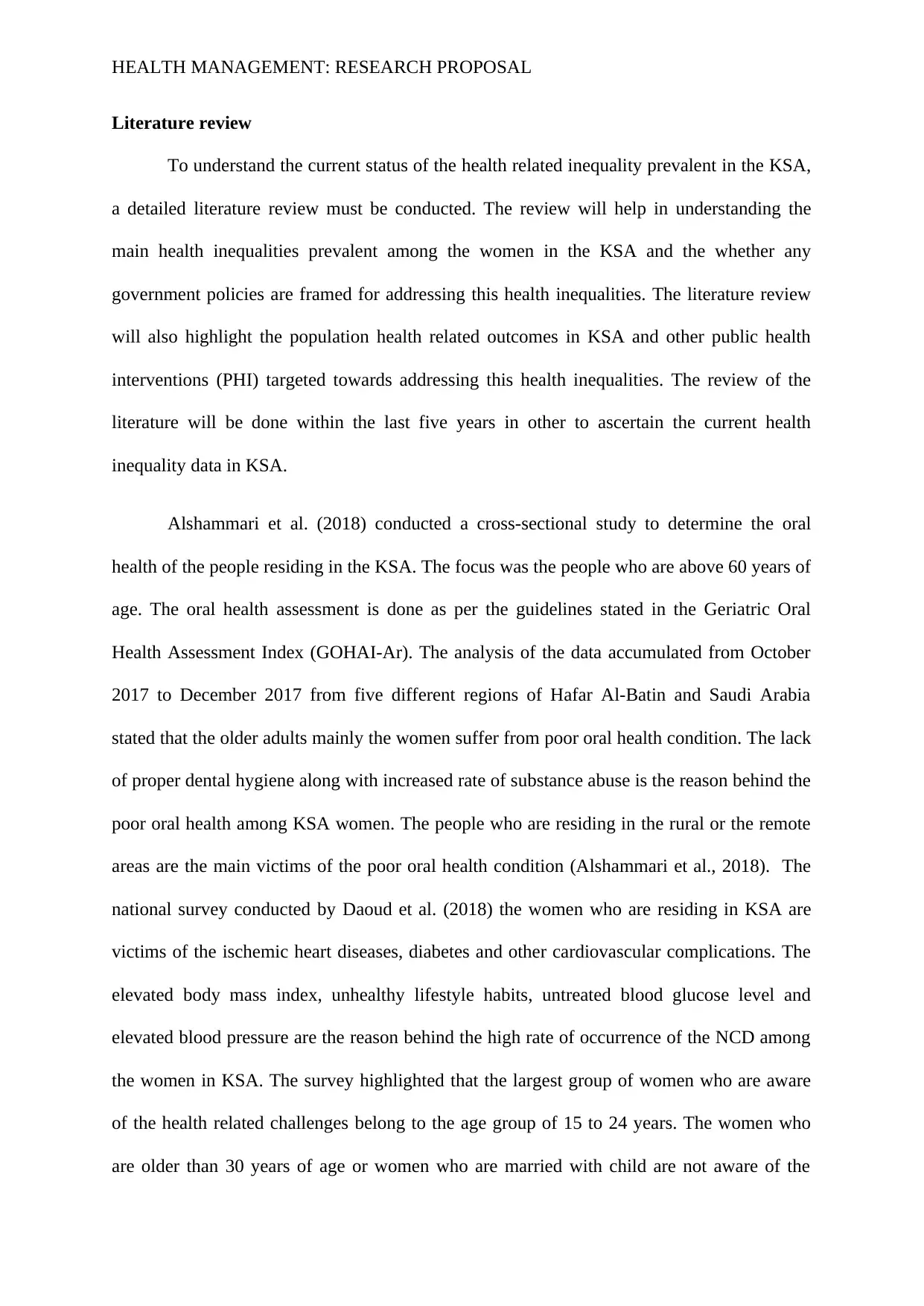
HEALTH MANAGEMENT: RESEARCH PROPOSAL
Literature review
To understand the current status of the health related inequality prevalent in the KSA,
a detailed literature review must be conducted. The review will help in understanding the
main health inequalities prevalent among the women in the KSA and the whether any
government policies are framed for addressing this health inequalities. The literature review
will also highlight the population health related outcomes in KSA and other public health
interventions (PHI) targeted towards addressing this health inequalities. The review of the
literature will be done within the last five years in other to ascertain the current health
inequality data in KSA.
Alshammari et al. (2018) conducted a cross-sectional study to determine the oral
health of the people residing in the KSA. The focus was the people who are above 60 years of
age. The oral health assessment is done as per the guidelines stated in the Geriatric Oral
Health Assessment Index (GOHAI-Ar). The analysis of the data accumulated from October
2017 to December 2017 from five different regions of Hafar Al-Batin and Saudi Arabia
stated that the older adults mainly the women suffer from poor oral health condition. The lack
of proper dental hygiene along with increased rate of substance abuse is the reason behind the
poor oral health among KSA women. The people who are residing in the rural or the remote
areas are the main victims of the poor oral health condition (Alshammari et al., 2018). The
national survey conducted by Daoud et al. (2018) the women who are residing in KSA are
victims of the ischemic heart diseases, diabetes and other cardiovascular complications. The
elevated body mass index, unhealthy lifestyle habits, untreated blood glucose level and
elevated blood pressure are the reason behind the high rate of occurrence of the NCD among
the women in KSA. The survey highlighted that the largest group of women who are aware
of the health related challenges belong to the age group of 15 to 24 years. The women who
are older than 30 years of age or women who are married with child are not aware of the
Literature review
To understand the current status of the health related inequality prevalent in the KSA,
a detailed literature review must be conducted. The review will help in understanding the
main health inequalities prevalent among the women in the KSA and the whether any
government policies are framed for addressing this health inequalities. The literature review
will also highlight the population health related outcomes in KSA and other public health
interventions (PHI) targeted towards addressing this health inequalities. The review of the
literature will be done within the last five years in other to ascertain the current health
inequality data in KSA.
Alshammari et al. (2018) conducted a cross-sectional study to determine the oral
health of the people residing in the KSA. The focus was the people who are above 60 years of
age. The oral health assessment is done as per the guidelines stated in the Geriatric Oral
Health Assessment Index (GOHAI-Ar). The analysis of the data accumulated from October
2017 to December 2017 from five different regions of Hafar Al-Batin and Saudi Arabia
stated that the older adults mainly the women suffer from poor oral health condition. The lack
of proper dental hygiene along with increased rate of substance abuse is the reason behind the
poor oral health among KSA women. The people who are residing in the rural or the remote
areas are the main victims of the poor oral health condition (Alshammari et al., 2018). The
national survey conducted by Daoud et al. (2018) the women who are residing in KSA are
victims of the ischemic heart diseases, diabetes and other cardiovascular complications. The
elevated body mass index, unhealthy lifestyle habits, untreated blood glucose level and
elevated blood pressure are the reason behind the high rate of occurrence of the NCD among
the women in KSA. The survey highlighted that the largest group of women who are aware
of the health related challenges belong to the age group of 15 to 24 years. The women who
are older than 30 years of age or women who are married with child are not aware of the
⊘ This is a preview!⊘
Do you want full access?
Subscribe today to unlock all pages.

Trusted by 1+ million students worldwide
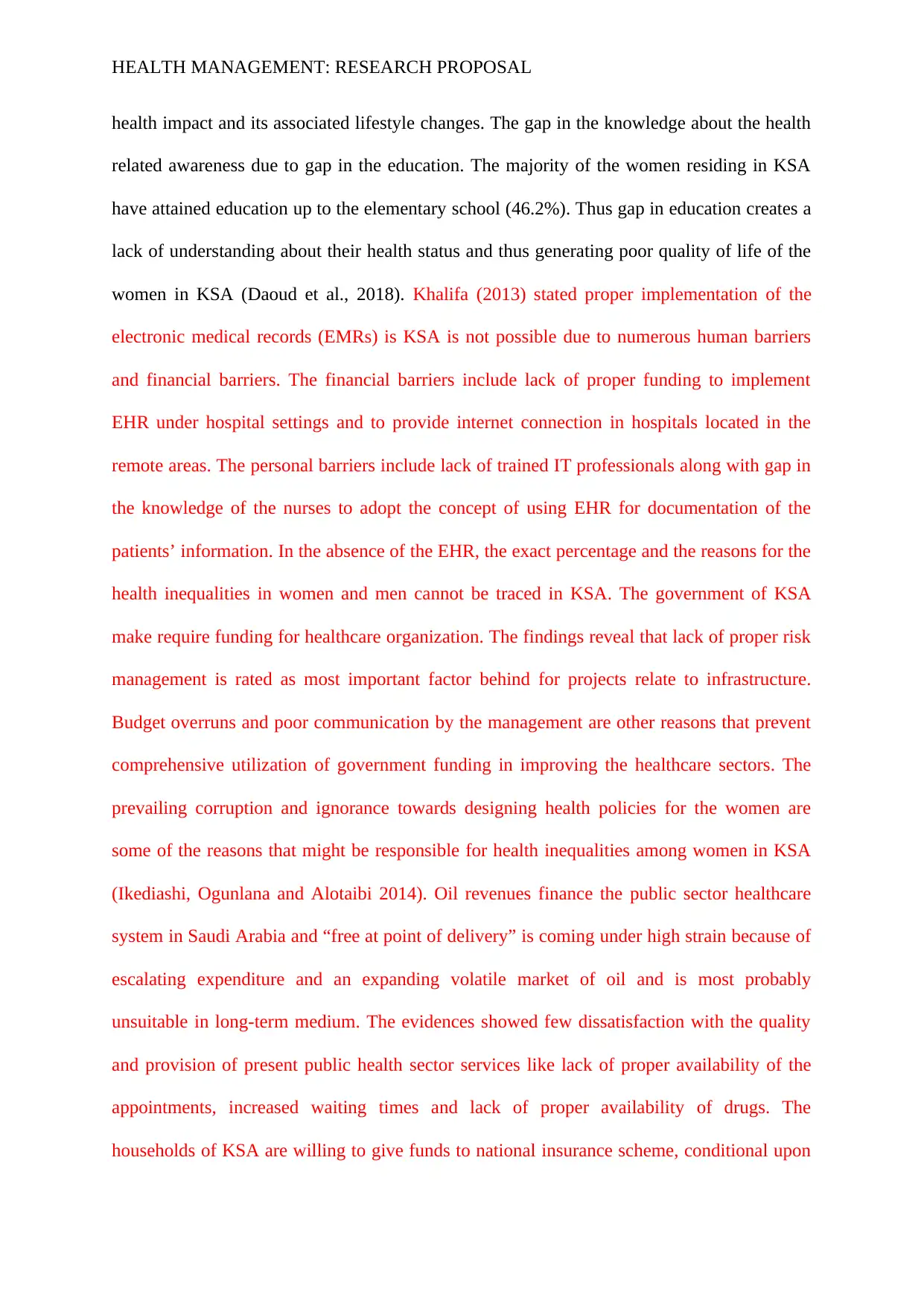
HEALTH MANAGEMENT: RESEARCH PROPOSAL
health impact and its associated lifestyle changes. The gap in the knowledge about the health
related awareness due to gap in the education. The majority of the women residing in KSA
have attained education up to the elementary school (46.2%). Thus gap in education creates a
lack of understanding about their health status and thus generating poor quality of life of the
women in KSA (Daoud et al., 2018). Khalifa (2013) stated proper implementation of the
electronic medical records (EMRs) is KSA is not possible due to numerous human barriers
and financial barriers. The financial barriers include lack of proper funding to implement
EHR under hospital settings and to provide internet connection in hospitals located in the
remote areas. The personal barriers include lack of trained IT professionals along with gap in
the knowledge of the nurses to adopt the concept of using EHR for documentation of the
patients’ information. In the absence of the EHR, the exact percentage and the reasons for the
health inequalities in women and men cannot be traced in KSA. The government of KSA
make require funding for healthcare organization. The findings reveal that lack of proper risk
management is rated as most important factor behind for projects relate to infrastructure.
Budget overruns and poor communication by the management are other reasons that prevent
comprehensive utilization of government funding in improving the healthcare sectors. The
prevailing corruption and ignorance towards designing health policies for the women are
some of the reasons that might be responsible for health inequalities among women in KSA
(Ikediashi, Ogunlana and Alotaibi 2014). Oil revenues finance the public sector healthcare
system in Saudi Arabia and “free at point of delivery” is coming under high strain because of
escalating expenditure and an expanding volatile market of oil and is most probably
unsuitable in long-term medium. The evidences showed few dissatisfaction with the quality
and provision of present public health sector services like lack of proper availability of the
appointments, increased waiting times and lack of proper availability of drugs. The
households of KSA are willing to give funds to national insurance scheme, conditional upon
health impact and its associated lifestyle changes. The gap in the knowledge about the health
related awareness due to gap in the education. The majority of the women residing in KSA
have attained education up to the elementary school (46.2%). Thus gap in education creates a
lack of understanding about their health status and thus generating poor quality of life of the
women in KSA (Daoud et al., 2018). Khalifa (2013) stated proper implementation of the
electronic medical records (EMRs) is KSA is not possible due to numerous human barriers
and financial barriers. The financial barriers include lack of proper funding to implement
EHR under hospital settings and to provide internet connection in hospitals located in the
remote areas. The personal barriers include lack of trained IT professionals along with gap in
the knowledge of the nurses to adopt the concept of using EHR for documentation of the
patients’ information. In the absence of the EHR, the exact percentage and the reasons for the
health inequalities in women and men cannot be traced in KSA. The government of KSA
make require funding for healthcare organization. The findings reveal that lack of proper risk
management is rated as most important factor behind for projects relate to infrastructure.
Budget overruns and poor communication by the management are other reasons that prevent
comprehensive utilization of government funding in improving the healthcare sectors. The
prevailing corruption and ignorance towards designing health policies for the women are
some of the reasons that might be responsible for health inequalities among women in KSA
(Ikediashi, Ogunlana and Alotaibi 2014). Oil revenues finance the public sector healthcare
system in Saudi Arabia and “free at point of delivery” is coming under high strain because of
escalating expenditure and an expanding volatile market of oil and is most probably
unsuitable in long-term medium. The evidences showed few dissatisfaction with the quality
and provision of present public health sector services like lack of proper availability of the
appointments, increased waiting times and lack of proper availability of drugs. The
households of KSA are willing to give funds to national insurance scheme, conditional upon
Paraphrase This Document
Need a fresh take? Get an instant paraphrase of this document with our AI Paraphraser
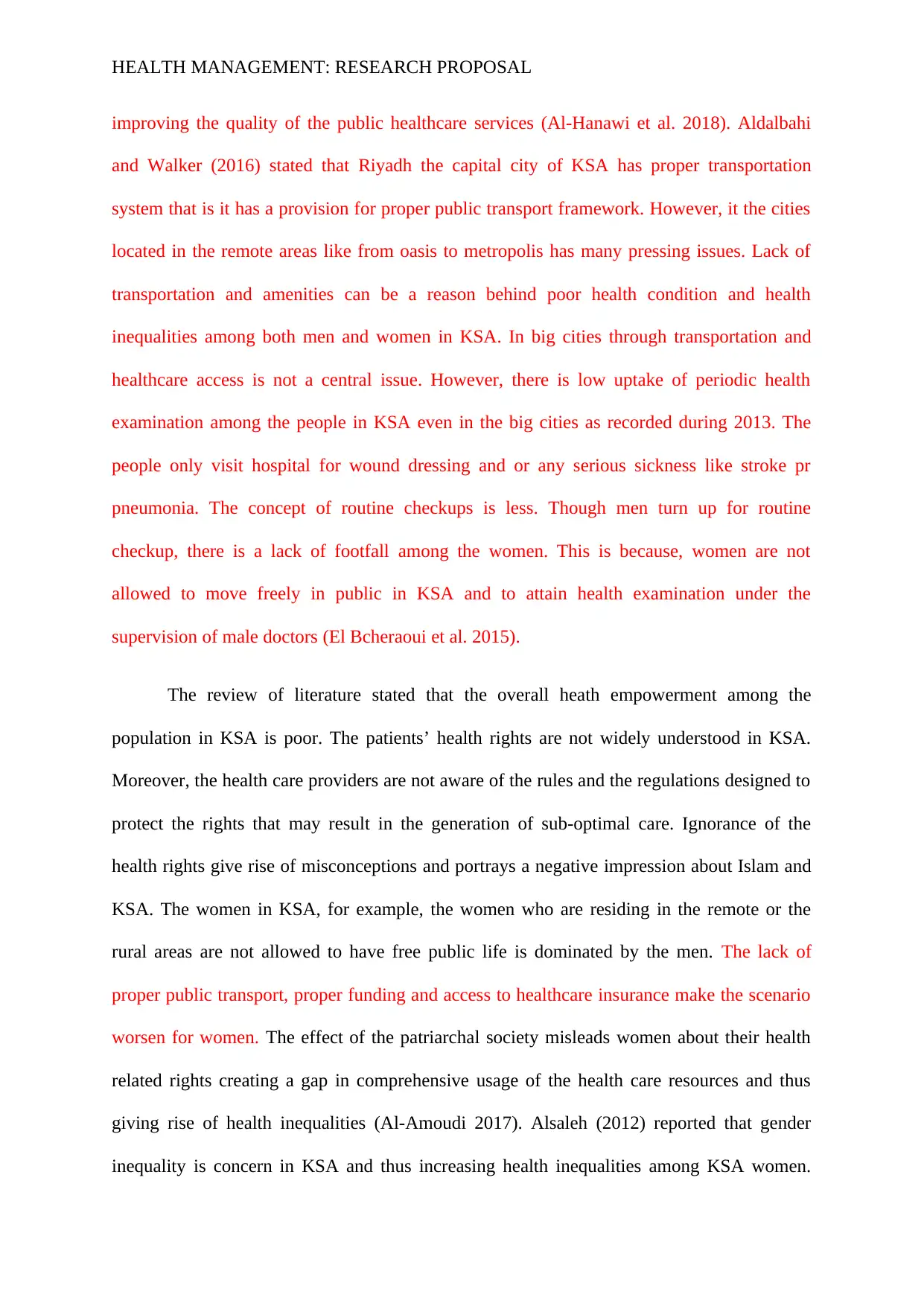
HEALTH MANAGEMENT: RESEARCH PROPOSAL
improving the quality of the public healthcare services (Al-Hanawi et al. 2018). Aldalbahi
and Walker (2016) stated that Riyadh the capital city of KSA has proper transportation
system that is it has a provision for proper public transport framework. However, it the cities
located in the remote areas like from oasis to metropolis has many pressing issues. Lack of
transportation and amenities can be a reason behind poor health condition and health
inequalities among both men and women in KSA. In big cities through transportation and
healthcare access is not a central issue. However, there is low uptake of periodic health
examination among the people in KSA even in the big cities as recorded during 2013. The
people only visit hospital for wound dressing and or any serious sickness like stroke pr
pneumonia. The concept of routine checkups is less. Though men turn up for routine
checkup, there is a lack of footfall among the women. This is because, women are not
allowed to move freely in public in KSA and to attain health examination under the
supervision of male doctors (El Bcheraoui et al. 2015).
The review of literature stated that the overall heath empowerment among the
population in KSA is poor. The patients’ health rights are not widely understood in KSA.
Moreover, the health care providers are not aware of the rules and the regulations designed to
protect the rights that may result in the generation of sub-optimal care. Ignorance of the
health rights give rise of misconceptions and portrays a negative impression about Islam and
KSA. The women in KSA, for example, the women who are residing in the remote or the
rural areas are not allowed to have free public life is dominated by the men. The lack of
proper public transport, proper funding and access to healthcare insurance make the scenario
worsen for women. The effect of the patriarchal society misleads women about their health
related rights creating a gap in comprehensive usage of the health care resources and thus
giving rise of health inequalities (Al-Amoudi 2017). Alsaleh (2012) reported that gender
inequality is concern in KSA and thus increasing health inequalities among KSA women.
improving the quality of the public healthcare services (Al-Hanawi et al. 2018). Aldalbahi
and Walker (2016) stated that Riyadh the capital city of KSA has proper transportation
system that is it has a provision for proper public transport framework. However, it the cities
located in the remote areas like from oasis to metropolis has many pressing issues. Lack of
transportation and amenities can be a reason behind poor health condition and health
inequalities among both men and women in KSA. In big cities through transportation and
healthcare access is not a central issue. However, there is low uptake of periodic health
examination among the people in KSA even in the big cities as recorded during 2013. The
people only visit hospital for wound dressing and or any serious sickness like stroke pr
pneumonia. The concept of routine checkups is less. Though men turn up for routine
checkup, there is a lack of footfall among the women. This is because, women are not
allowed to move freely in public in KSA and to attain health examination under the
supervision of male doctors (El Bcheraoui et al. 2015).
The review of literature stated that the overall heath empowerment among the
population in KSA is poor. The patients’ health rights are not widely understood in KSA.
Moreover, the health care providers are not aware of the rules and the regulations designed to
protect the rights that may result in the generation of sub-optimal care. Ignorance of the
health rights give rise of misconceptions and portrays a negative impression about Islam and
KSA. The women in KSA, for example, the women who are residing in the remote or the
rural areas are not allowed to have free public life is dominated by the men. The lack of
proper public transport, proper funding and access to healthcare insurance make the scenario
worsen for women. The effect of the patriarchal society misleads women about their health
related rights creating a gap in comprehensive usage of the health care resources and thus
giving rise of health inequalities (Al-Amoudi 2017). Alsaleh (2012) reported that gender
inequality is concern in KSA and thus increasing health inequalities among KSA women.
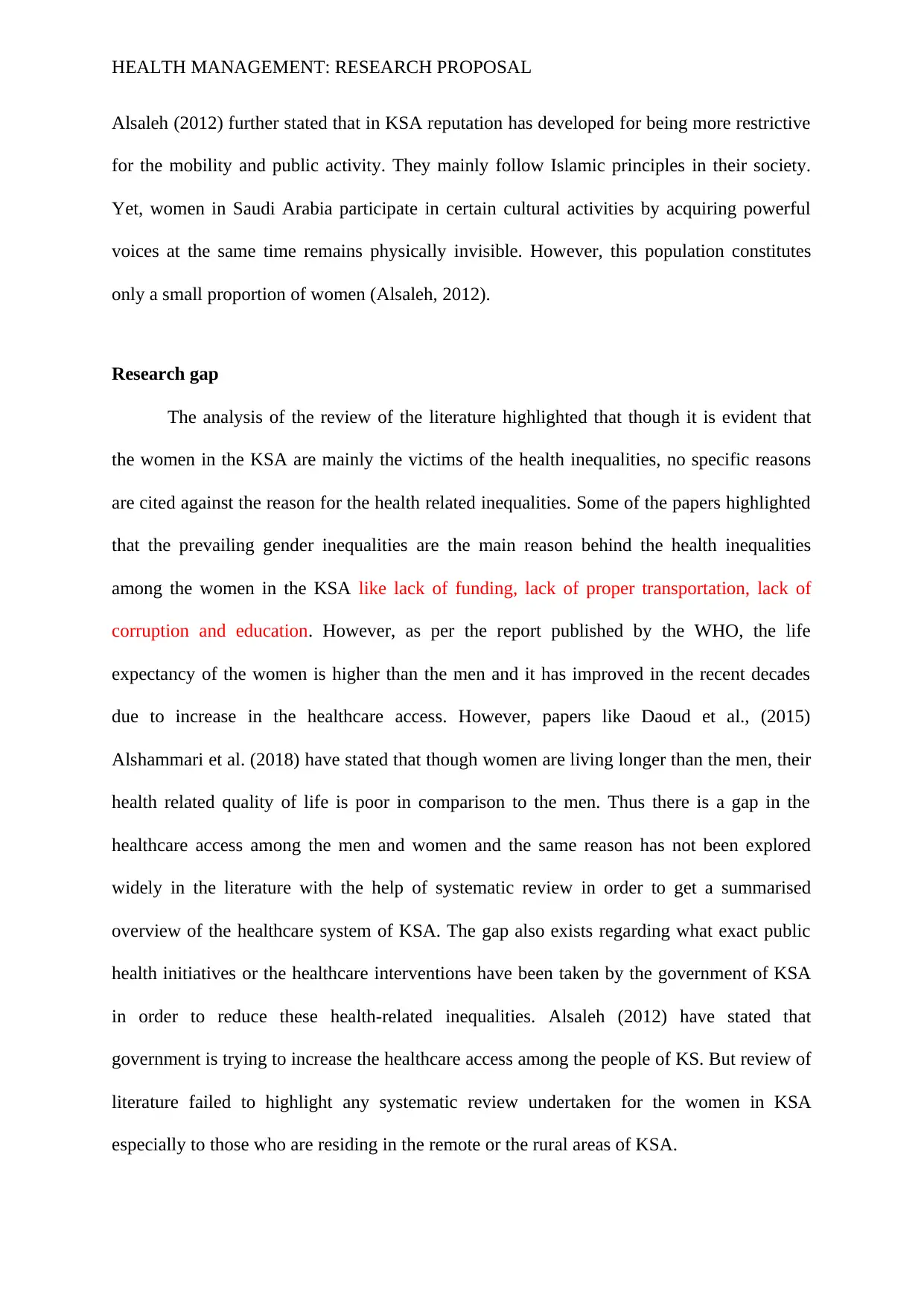
HEALTH MANAGEMENT: RESEARCH PROPOSAL
Alsaleh (2012) further stated that in KSA reputation has developed for being more restrictive
for the mobility and public activity. They mainly follow Islamic principles in their society.
Yet, women in Saudi Arabia participate in certain cultural activities by acquiring powerful
voices at the same time remains physically invisible. However, this population constitutes
only a small proportion of women (Alsaleh, 2012).
Research gap
The analysis of the review of the literature highlighted that though it is evident that
the women in the KSA are mainly the victims of the health inequalities, no specific reasons
are cited against the reason for the health related inequalities. Some of the papers highlighted
that the prevailing gender inequalities are the main reason behind the health inequalities
among the women in the KSA like lack of funding, lack of proper transportation, lack of
corruption and education. However, as per the report published by the WHO, the life
expectancy of the women is higher than the men and it has improved in the recent decades
due to increase in the healthcare access. However, papers like Daoud et al., (2015)
Alshammari et al. (2018) have stated that though women are living longer than the men, their
health related quality of life is poor in comparison to the men. Thus there is a gap in the
healthcare access among the men and women and the same reason has not been explored
widely in the literature with the help of systematic review in order to get a summarised
overview of the healthcare system of KSA. The gap also exists regarding what exact public
health initiatives or the healthcare interventions have been taken by the government of KSA
in order to reduce these health-related inequalities. Alsaleh (2012) have stated that
government is trying to increase the healthcare access among the people of KS. But review of
literature failed to highlight any systematic review undertaken for the women in KSA
especially to those who are residing in the remote or the rural areas of KSA.
Alsaleh (2012) further stated that in KSA reputation has developed for being more restrictive
for the mobility and public activity. They mainly follow Islamic principles in their society.
Yet, women in Saudi Arabia participate in certain cultural activities by acquiring powerful
voices at the same time remains physically invisible. However, this population constitutes
only a small proportion of women (Alsaleh, 2012).
Research gap
The analysis of the review of the literature highlighted that though it is evident that
the women in the KSA are mainly the victims of the health inequalities, no specific reasons
are cited against the reason for the health related inequalities. Some of the papers highlighted
that the prevailing gender inequalities are the main reason behind the health inequalities
among the women in the KSA like lack of funding, lack of proper transportation, lack of
corruption and education. However, as per the report published by the WHO, the life
expectancy of the women is higher than the men and it has improved in the recent decades
due to increase in the healthcare access. However, papers like Daoud et al., (2015)
Alshammari et al. (2018) have stated that though women are living longer than the men, their
health related quality of life is poor in comparison to the men. Thus there is a gap in the
healthcare access among the men and women and the same reason has not been explored
widely in the literature with the help of systematic review in order to get a summarised
overview of the healthcare system of KSA. The gap also exists regarding what exact public
health initiatives or the healthcare interventions have been taken by the government of KSA
in order to reduce these health-related inequalities. Alsaleh (2012) have stated that
government is trying to increase the healthcare access among the people of KS. But review of
literature failed to highlight any systematic review undertaken for the women in KSA
especially to those who are residing in the remote or the rural areas of KSA.
⊘ This is a preview!⊘
Do you want full access?
Subscribe today to unlock all pages.

Trusted by 1+ million students worldwide
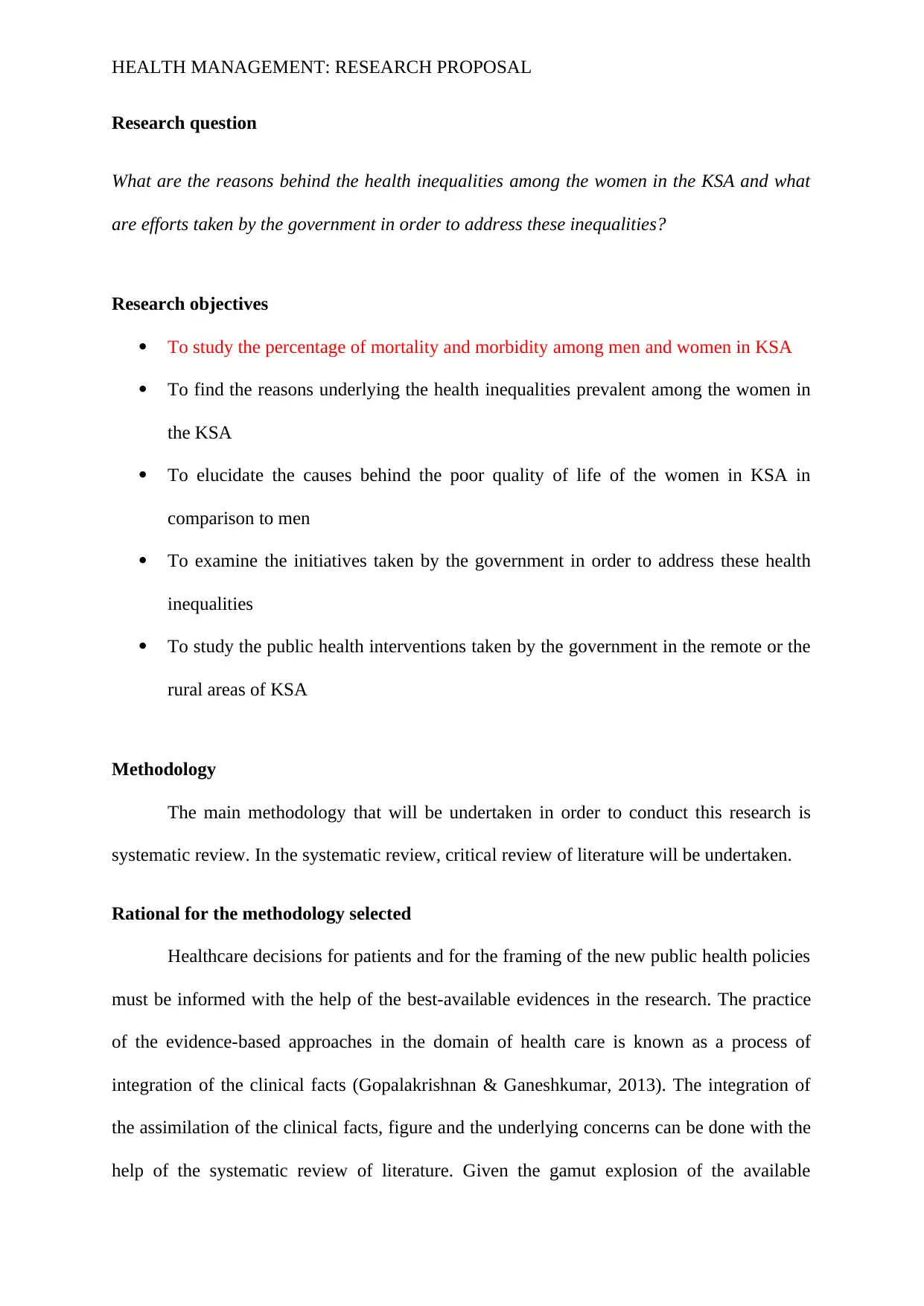
HEALTH MANAGEMENT: RESEARCH PROPOSAL
Research question
What are the reasons behind the health inequalities among the women in the KSA and what
are efforts taken by the government in order to address these inequalities?
Research objectives
To study the percentage of mortality and morbidity among men and women in KSA
To find the reasons underlying the health inequalities prevalent among the women in
the KSA
To elucidate the causes behind the poor quality of life of the women in KSA in
comparison to men
To examine the initiatives taken by the government in order to address these health
inequalities
To study the public health interventions taken by the government in the remote or the
rural areas of KSA
Methodology
The main methodology that will be undertaken in order to conduct this research is
systematic review. In the systematic review, critical review of literature will be undertaken.
Rational for the methodology selected
Healthcare decisions for patients and for the framing of the new public health policies
must be informed with the help of the best-available evidences in the research. The practice
of the evidence-based approaches in the domain of health care is known as a process of
integration of the clinical facts (Gopalakrishnan & Ganeshkumar, 2013). The integration of
the assimilation of the clinical facts, figure and the underlying concerns can be done with the
help of the systematic review of literature. Given the gamut explosion of the available
Research question
What are the reasons behind the health inequalities among the women in the KSA and what
are efforts taken by the government in order to address these inequalities?
Research objectives
To study the percentage of mortality and morbidity among men and women in KSA
To find the reasons underlying the health inequalities prevalent among the women in
the KSA
To elucidate the causes behind the poor quality of life of the women in KSA in
comparison to men
To examine the initiatives taken by the government in order to address these health
inequalities
To study the public health interventions taken by the government in the remote or the
rural areas of KSA
Methodology
The main methodology that will be undertaken in order to conduct this research is
systematic review. In the systematic review, critical review of literature will be undertaken.
Rational for the methodology selected
Healthcare decisions for patients and for the framing of the new public health policies
must be informed with the help of the best-available evidences in the research. The practice
of the evidence-based approaches in the domain of health care is known as a process of
integration of the clinical facts (Gopalakrishnan & Ganeshkumar, 2013). The integration of
the assimilation of the clinical facts, figure and the underlying concerns can be done with the
help of the systematic review of literature. Given the gamut explosion of the available
Paraphrase This Document
Need a fresh take? Get an instant paraphrase of this document with our AI Paraphraser
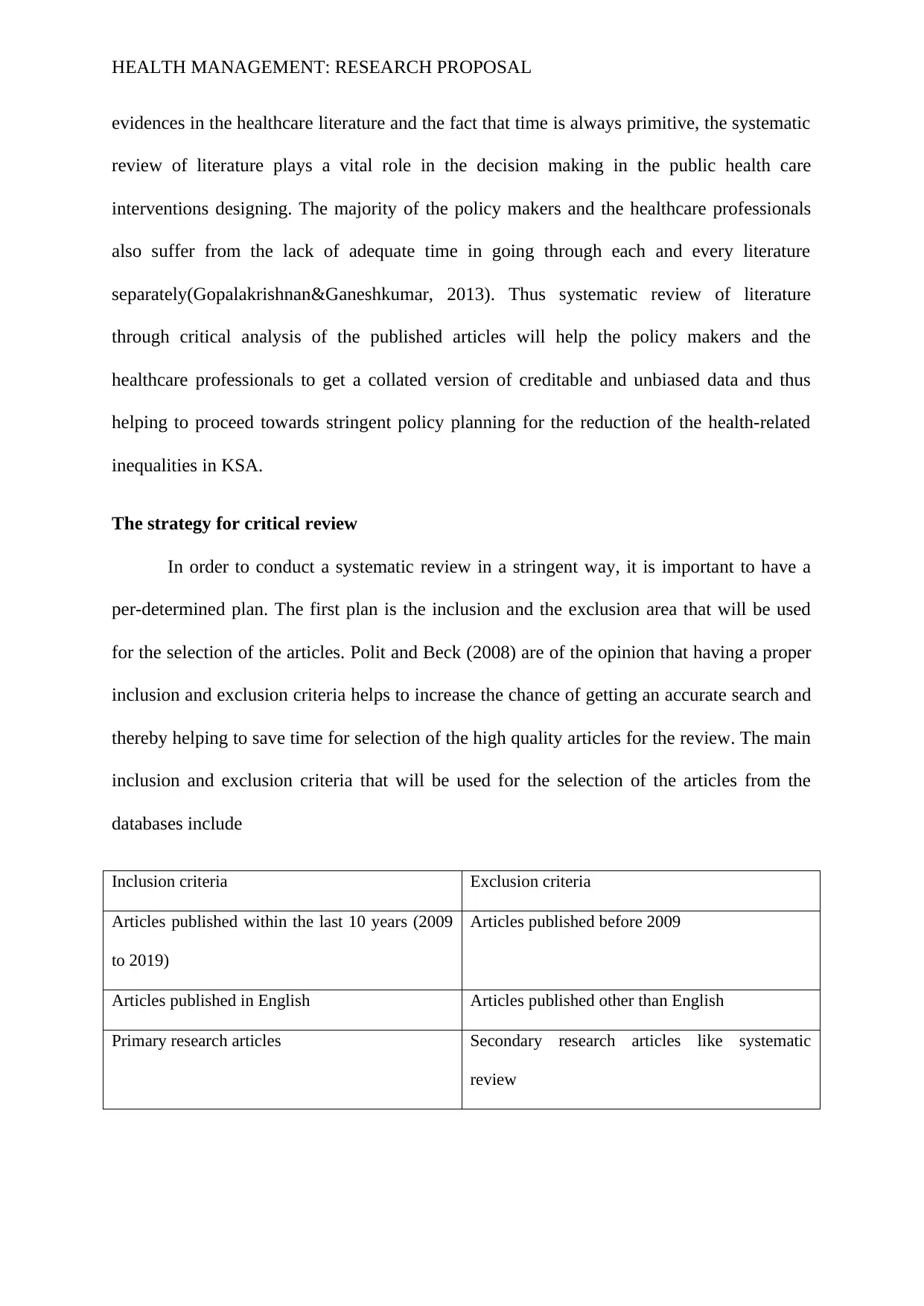
HEALTH MANAGEMENT: RESEARCH PROPOSAL
evidences in the healthcare literature and the fact that time is always primitive, the systematic
review of literature plays a vital role in the decision making in the public health care
interventions designing. The majority of the policy makers and the healthcare professionals
also suffer from the lack of adequate time in going through each and every literature
separately(Gopalakrishnan&Ganeshkumar, 2013). Thus systematic review of literature
through critical analysis of the published articles will help the policy makers and the
healthcare professionals to get a collated version of creditable and unbiased data and thus
helping to proceed towards stringent policy planning for the reduction of the health-related
inequalities in KSA.
The strategy for critical review
In order to conduct a systematic review in a stringent way, it is important to have a
per-determined plan. The first plan is the inclusion and the exclusion area that will be used
for the selection of the articles. Polit and Beck (2008) are of the opinion that having a proper
inclusion and exclusion criteria helps to increase the chance of getting an accurate search and
thereby helping to save time for selection of the high quality articles for the review. The main
inclusion and exclusion criteria that will be used for the selection of the articles from the
databases include
Inclusion criteria Exclusion criteria
Articles published within the last 10 years (2009
to 2019)
Articles published before 2009
Articles published in English Articles published other than English
Primary research articles Secondary research articles like systematic
review
evidences in the healthcare literature and the fact that time is always primitive, the systematic
review of literature plays a vital role in the decision making in the public health care
interventions designing. The majority of the policy makers and the healthcare professionals
also suffer from the lack of adequate time in going through each and every literature
separately(Gopalakrishnan&Ganeshkumar, 2013). Thus systematic review of literature
through critical analysis of the published articles will help the policy makers and the
healthcare professionals to get a collated version of creditable and unbiased data and thus
helping to proceed towards stringent policy planning for the reduction of the health-related
inequalities in KSA.
The strategy for critical review
In order to conduct a systematic review in a stringent way, it is important to have a
per-determined plan. The first plan is the inclusion and the exclusion area that will be used
for the selection of the articles. Polit and Beck (2008) are of the opinion that having a proper
inclusion and exclusion criteria helps to increase the chance of getting an accurate search and
thereby helping to save time for selection of the high quality articles for the review. The main
inclusion and exclusion criteria that will be used for the selection of the articles from the
databases include
Inclusion criteria Exclusion criteria
Articles published within the last 10 years (2009
to 2019)
Articles published before 2009
Articles published in English Articles published other than English
Primary research articles Secondary research articles like systematic
review
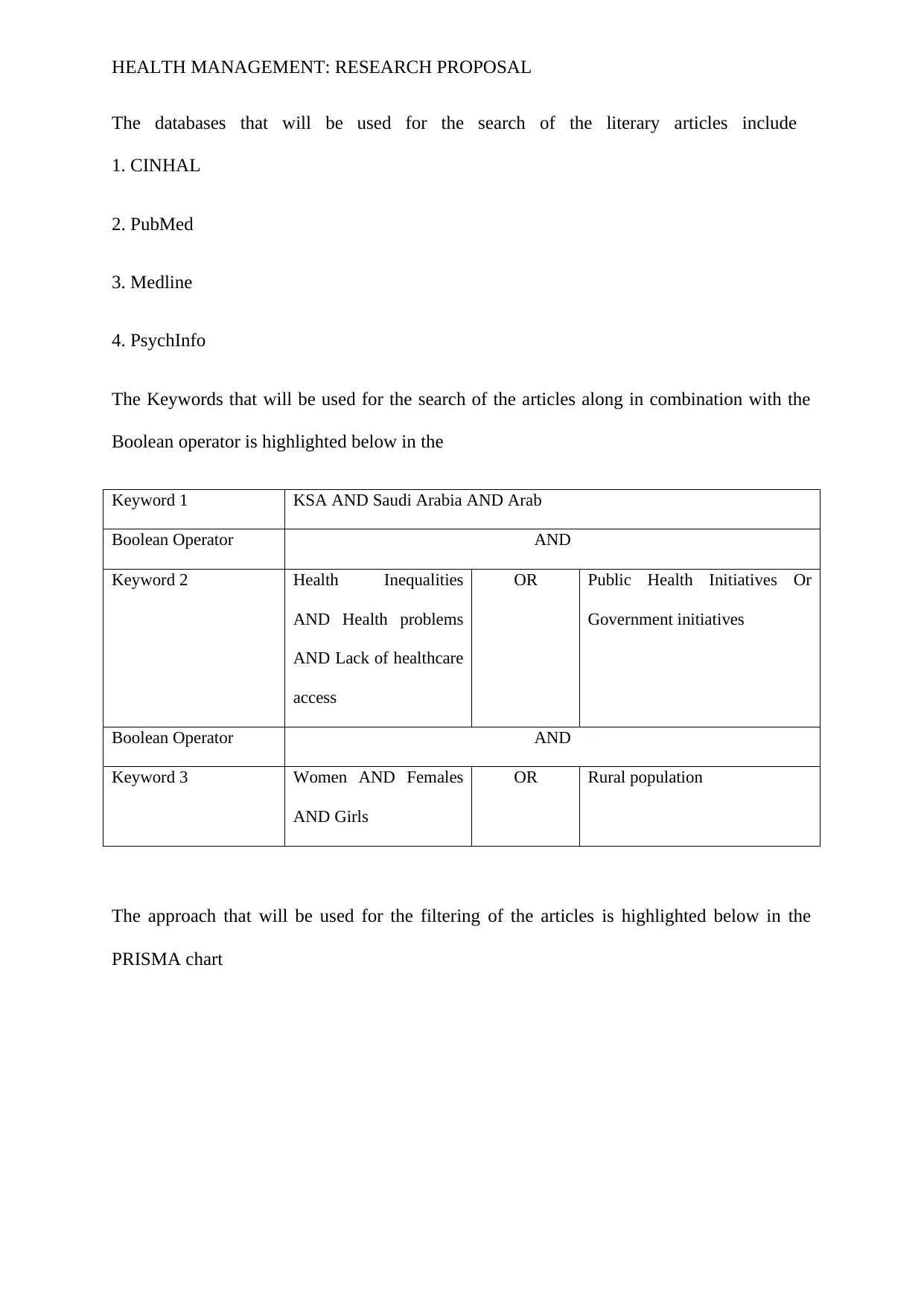
HEALTH MANAGEMENT: RESEARCH PROPOSAL
The databases that will be used for the search of the literary articles include
1. CINHAL
2. PubMed
3. Medline
4. PsychInfo
The Keywords that will be used for the search of the articles along in combination with the
Boolean operator is highlighted below in the
Keyword 1 KSA AND Saudi Arabia AND Arab
Boolean Operator AND
Keyword 2 Health Inequalities
AND Health problems
AND Lack of healthcare
access
OR Public Health Initiatives Or
Government initiatives
Boolean Operator AND
Keyword 3 Women AND Females
AND Girls
OR Rural population
The approach that will be used for the filtering of the articles is highlighted below in the
PRISMA chart
The databases that will be used for the search of the literary articles include
1. CINHAL
2. PubMed
3. Medline
4. PsychInfo
The Keywords that will be used for the search of the articles along in combination with the
Boolean operator is highlighted below in the
Keyword 1 KSA AND Saudi Arabia AND Arab
Boolean Operator AND
Keyword 2 Health Inequalities
AND Health problems
AND Lack of healthcare
access
OR Public Health Initiatives Or
Government initiatives
Boolean Operator AND
Keyword 3 Women AND Females
AND Girls
OR Rural population
The approach that will be used for the filtering of the articles is highlighted below in the
PRISMA chart
⊘ This is a preview!⊘
Do you want full access?
Subscribe today to unlock all pages.

Trusted by 1+ million students worldwide
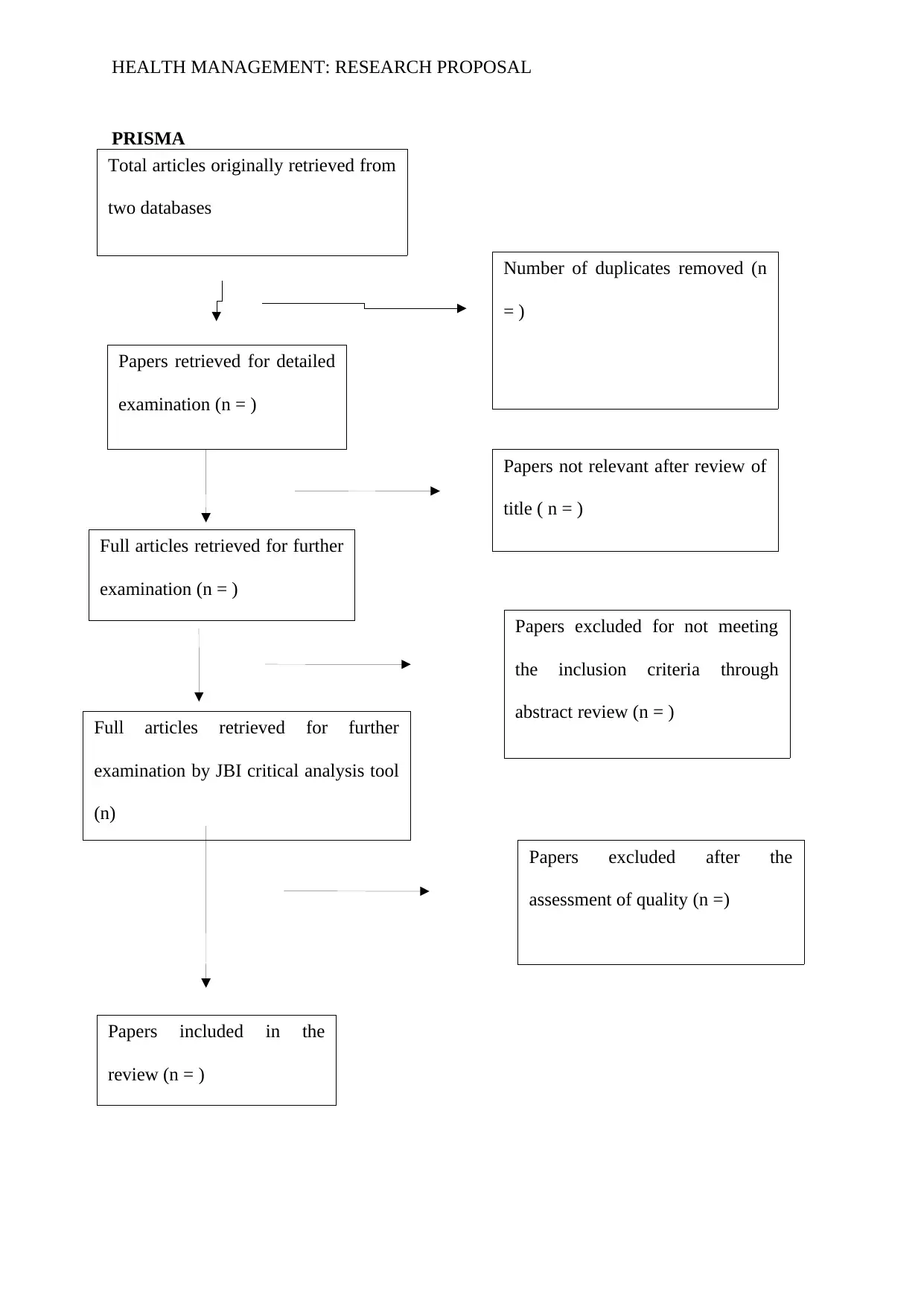
HEALTH MANAGEMENT: RESEARCH PROPOSAL
PRISMA
Total articles originally retrieved from
two databases
Number of duplicates removed (n
= )
Full articles retrieved for further
examination (n = )
Papers not relevant after review of
title ( n = )
Papers retrieved for detailed
examination (n = )
Full articles retrieved for further
examination by JBI critical analysis tool
(n)
Papers included in the
review (n = )
Papers excluded for not meeting
the inclusion criteria through
abstract review (n = )
Papers excluded after the
assessment of quality (n =)
PRISMA
Total articles originally retrieved from
two databases
Number of duplicates removed (n
= )
Full articles retrieved for further
examination (n = )
Papers not relevant after review of
title ( n = )
Papers retrieved for detailed
examination (n = )
Full articles retrieved for further
examination by JBI critical analysis tool
(n)
Papers included in the
review (n = )
Papers excluded for not meeting
the inclusion criteria through
abstract review (n = )
Papers excluded after the
assessment of quality (n =)
Paraphrase This Document
Need a fresh take? Get an instant paraphrase of this document with our AI Paraphraser
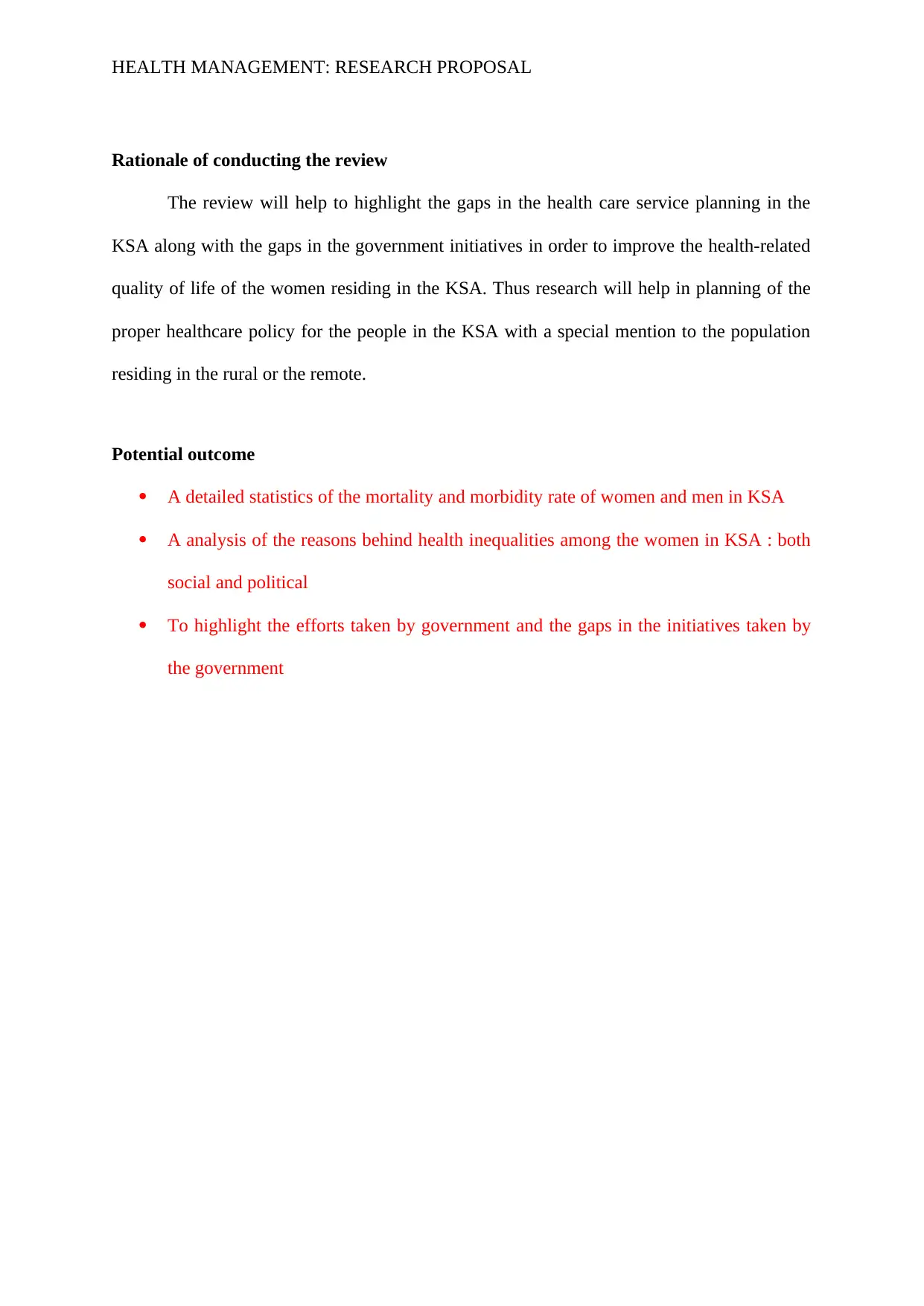
HEALTH MANAGEMENT: RESEARCH PROPOSAL
Rationale of conducting the review
The review will help to highlight the gaps in the health care service planning in the
KSA along with the gaps in the government initiatives in order to improve the health-related
quality of life of the women residing in the KSA. Thus research will help in planning of the
proper healthcare policy for the people in the KSA with a special mention to the population
residing in the rural or the remote.
Potential outcome
A detailed statistics of the mortality and morbidity rate of women and men in KSA
A analysis of the reasons behind health inequalities among the women in KSA : both
social and political
To highlight the efforts taken by government and the gaps in the initiatives taken by
the government
Rationale of conducting the review
The review will help to highlight the gaps in the health care service planning in the
KSA along with the gaps in the government initiatives in order to improve the health-related
quality of life of the women residing in the KSA. Thus research will help in planning of the
proper healthcare policy for the people in the KSA with a special mention to the population
residing in the rural or the remote.
Potential outcome
A detailed statistics of the mortality and morbidity rate of women and men in KSA
A analysis of the reasons behind health inequalities among the women in KSA : both
social and political
To highlight the efforts taken by government and the gaps in the initiatives taken by
the government
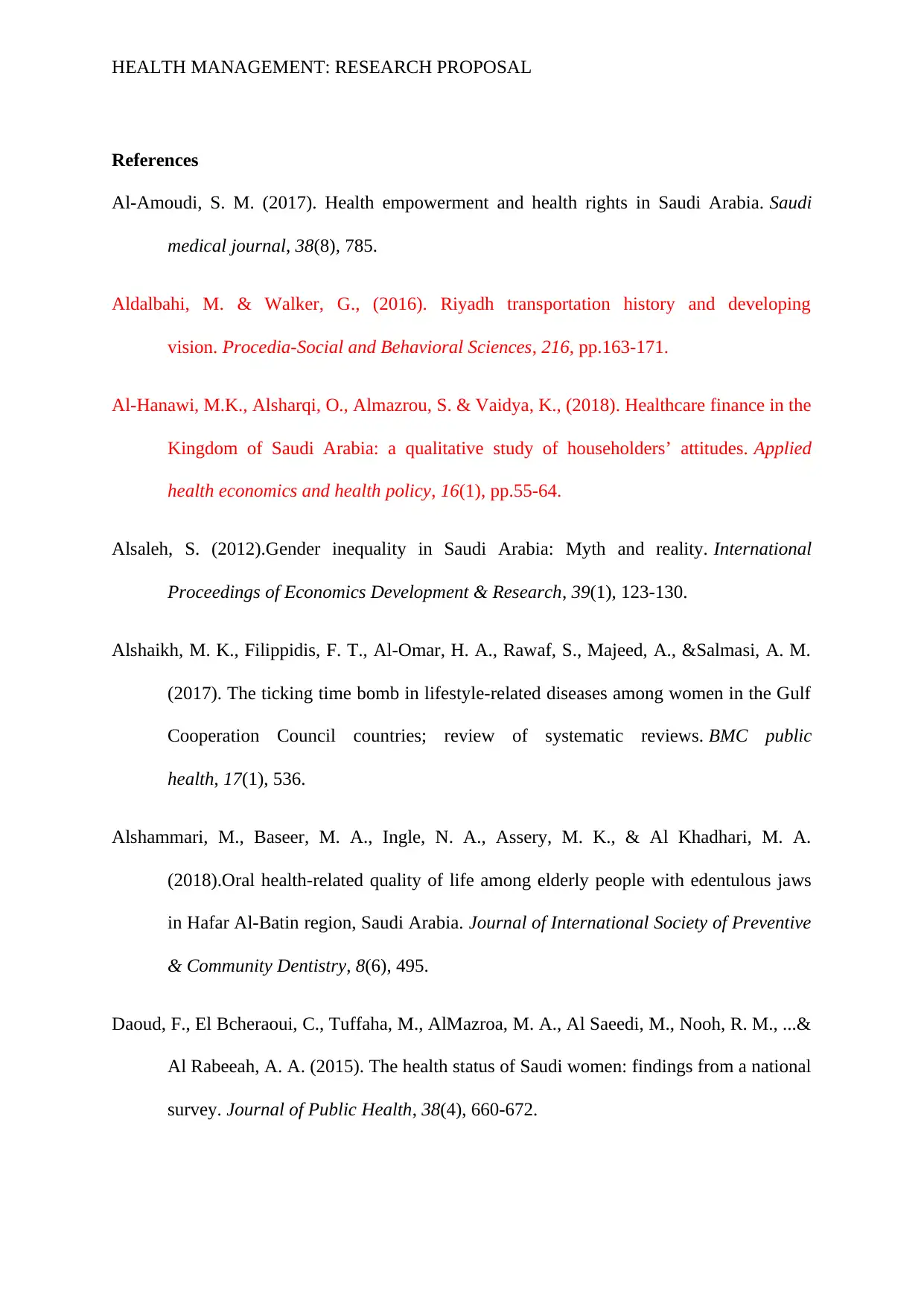
HEALTH MANAGEMENT: RESEARCH PROPOSAL
References
Al-Amoudi, S. M. (2017). Health empowerment and health rights in Saudi Arabia. Saudi
medical journal, 38(8), 785.
Aldalbahi, M. & Walker, G., (2016). Riyadh transportation history and developing
vision. Procedia-Social and Behavioral Sciences, 216, pp.163-171.
Al-Hanawi, M.K., Alsharqi, O., Almazrou, S. & Vaidya, K., (2018). Healthcare finance in the
Kingdom of Saudi Arabia: a qualitative study of householders’ attitudes. Applied
health economics and health policy, 16(1), pp.55-64.
Alsaleh, S. (2012).Gender inequality in Saudi Arabia: Myth and reality. International
Proceedings of Economics Development & Research, 39(1), 123-130.
Alshaikh, M. K., Filippidis, F. T., Al-Omar, H. A., Rawaf, S., Majeed, A., &Salmasi, A. M.
(2017). The ticking time bomb in lifestyle-related diseases among women in the Gulf
Cooperation Council countries; review of systematic reviews. BMC public
health, 17(1), 536.
Alshammari, M., Baseer, M. A., Ingle, N. A., Assery, M. K., & Al Khadhari, M. A.
(2018).Oral health-related quality of life among elderly people with edentulous jaws
in Hafar Al-Batin region, Saudi Arabia. Journal of International Society of Preventive
& Community Dentistry, 8(6), 495.
Daoud, F., El Bcheraoui, C., Tuffaha, M., AlMazroa, M. A., Al Saeedi, M., Nooh, R. M., ...&
Al Rabeeah, A. A. (2015). The health status of Saudi women: findings from a national
survey. Journal of Public Health, 38(4), 660-672.
References
Al-Amoudi, S. M. (2017). Health empowerment and health rights in Saudi Arabia. Saudi
medical journal, 38(8), 785.
Aldalbahi, M. & Walker, G., (2016). Riyadh transportation history and developing
vision. Procedia-Social and Behavioral Sciences, 216, pp.163-171.
Al-Hanawi, M.K., Alsharqi, O., Almazrou, S. & Vaidya, K., (2018). Healthcare finance in the
Kingdom of Saudi Arabia: a qualitative study of householders’ attitudes. Applied
health economics and health policy, 16(1), pp.55-64.
Alsaleh, S. (2012).Gender inequality in Saudi Arabia: Myth and reality. International
Proceedings of Economics Development & Research, 39(1), 123-130.
Alshaikh, M. K., Filippidis, F. T., Al-Omar, H. A., Rawaf, S., Majeed, A., &Salmasi, A. M.
(2017). The ticking time bomb in lifestyle-related diseases among women in the Gulf
Cooperation Council countries; review of systematic reviews. BMC public
health, 17(1), 536.
Alshammari, M., Baseer, M. A., Ingle, N. A., Assery, M. K., & Al Khadhari, M. A.
(2018).Oral health-related quality of life among elderly people with edentulous jaws
in Hafar Al-Batin region, Saudi Arabia. Journal of International Society of Preventive
& Community Dentistry, 8(6), 495.
Daoud, F., El Bcheraoui, C., Tuffaha, M., AlMazroa, M. A., Al Saeedi, M., Nooh, R. M., ...&
Al Rabeeah, A. A. (2015). The health status of Saudi women: findings from a national
survey. Journal of Public Health, 38(4), 660-672.
⊘ This is a preview!⊘
Do you want full access?
Subscribe today to unlock all pages.

Trusted by 1+ million students worldwide
1 out of 14